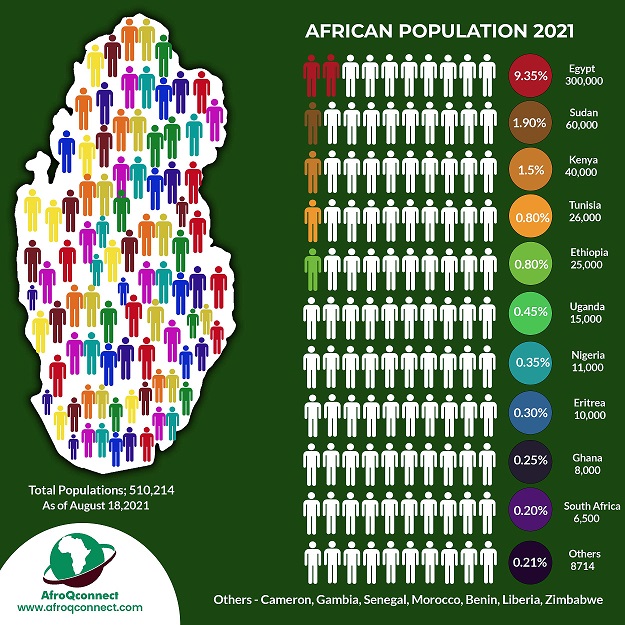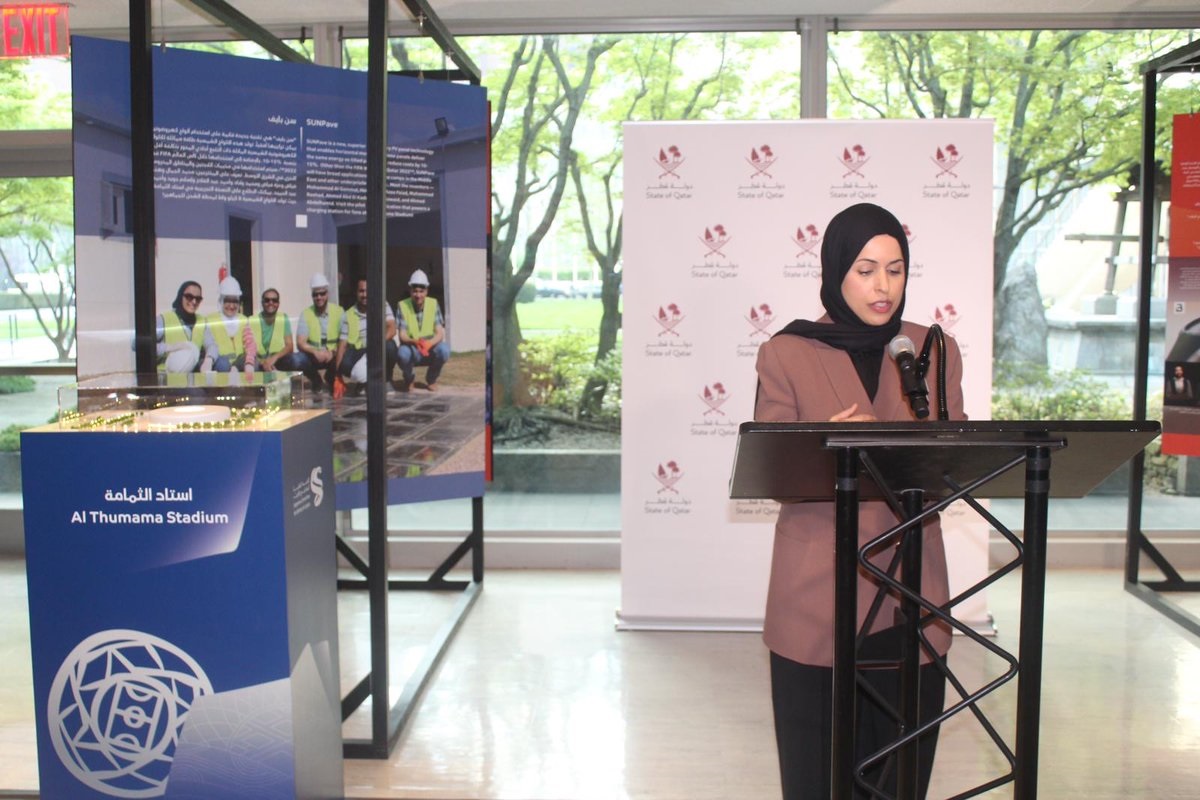Qatar, a country of Western Asia and a sovereign emirate located at the west coast of the Persian Gulf and shares a border with eastern Saudi Arabia, has remained, over the years, a favorite place of abode for a plethora of people, from all walks of life. From prehistoric times to the modern days, the country has continuously been inhabited by a relatively less dense population.
The prominent reason claimed by many for this, is due to its geographical disposition, in that, the country occupies a small desert peninsula extending northward from the larger Arabian Peninsula, and by this, its area is mostly stony, sandy, and barren and consists of salt flats, dune desert, and arid plains.
Chiefly Arabic-speaking and Islamic by religion, Qatar is reputed, however, to be a home for all. This is because, Qataris express a great deal of tolerance for the cultures, beliefs, languages, and religious inclinations of others.
Matter-of-factly, the vast majority of its population is comprised by expatriates from far and near countries; christians and non-christians alike; Indians, Bangladeshis, Filipinos and even Africans; and with the Qatari people only making up a small percentage of the entire country’s population. To that end, English was embraced as a common language for business and social interactions in the state.
The paradoxical reality in Qatar, particularly with regards to the population numbers by different nationalities, puts the state on the demographic limelight and of especial interest to demographers around the world. The undeniable reality of how a nation’s locals could become a minority even in their own country, is mind-boggling and seemingly inconceivable.
With an estimated total population of approximately three million people, as of 2022, Qataris account for only about 11% of this population. Astonishing right?! Also, there have been consistent decrease in the percentage proportionality of the citizens in relation to non-citizens, over the years.

To that end, despite the latency of the numbers, as the precise breakdown by nationality is not something that is made available to the general public by either Qatars Planning and Statistics Authority (PSA), Ministry of Interior, the Permanent Population Committee or any other Governmental body, demographers and population statisticians have however, delved keenly into research and findings about the nationals in Qatar, using relevant statistical models and metrics, and today, they have provided essential statistical details of the population of Qatar by nationalities.
WHY EXPATRIATES SUPERSEDES QATARIS IN NUMBER
Economic growth in the State of Qatar began in the 1970s as was also seen in other countries of the Gulf Cooperation Council (GCC), where foreign workers were employed to carry out most of the economic activities in the country, with Pakistanis, Indians and Iranians largely predominant.
This included foreign workers who were involved in the production process of the petroleum and natural gas of the state, even as Qatar has one of the world’s largest oil reserves. Qatar relies on foreign labour till date. Today, the country’s economy is known as an economy built on expatriates.
Furthermore, Qatar’s fame for security, luxury and continuous economic revamp lured tourists and job-seeking individuals from other countries into the state. Consequently, Qatar has consistently seen significant increase in the number of immigrants and migrant workers, who now outnumber the country’s indigenous citizenry.
When asked on the status of the countrys large expatriate community, the ruling emir excitedly asserted, in Qatar, they find security and a dignified livelihood.
AFRICAN NATIONALITIES IN QATAR
Of course, contributing to the vast community of expatriates are African nationals, from across the continent. Many comprise a small individual percentage of the population, while some constitute a larger percentage.
African countries like Nigeria and Ghana, for instance, present about 11, 000 and 8,000 nationals in Qatar, respectively. While countries like Egypt presents as large as about 300,000 expatriates in Qatar.
The data below shows a list of African countries with their respective population figures and percentage.

TRENDS IN AFRICAN EXPAT POPULATION GROWTH IN QATAR
From the last three years, the growth in Qatar’s population as a whole can be considered relatively slowed down, especially when compared to the explosive years which started around 2003, where there was a massive surge in Qatar’s population of both citizens and expats. The differences in how much individual communities are growing are also significant, and particularly, the African communities.
A prominent change has been recorded in the Egyptian population, with the number increasing from 200,000 to 300,000 nationals within a period of only three years (2015 to 2018). However, the figures presented by the Minister of State for Emigration and Egyptian Expatriates, have the possibility of being politically motivated, considering the hostile relationship between the two countries in recent times.
Significant changes have also been reported in smaller African ethnic groups in Qatar, with the biggest increases recorded between 2013 and 2019. Kenyans surged from 5,000 to 30,000. Nigerians, from 6,500 to 10,000. While South Africans increased considerably, from 3,000 to 6,500.
EGYPTIANS IN QATAR
Egyptians emigrating from Egypt was a rare phenomenon until Gamal Abdel Nasser came to power after overthrowing the monarchial government in 1952. Before then, Cleland’s 1936 declaration remained valid, that “Egyptians have the reputation of preferring their own soil.

Few ever leave except to study or travel; and they always return… Egyptians do not emigrate.” However, as seen today, with a more liberalised emigration policy, millions of Egyptians are scattered across nations, both in Western countries, as well as across the Arab world, Qatar inclusive.
Despite its unfriendly bilateral relations with the state of Qatar, the Egyptian population in the Gulf country seems to be waxing stronger. With a population of over 300,000 nationals, the community of Egyptian expats in Qatar is witnessing a rallying increase, with members having roots all across Egypt – from Alexandria, over Hurghada to Cairo.
These numbers prove to be the largest of foreign contingents in the Qatar from a single African state. Also predominantly Arabic-speaking and largely Muslims, Egyptians find it relatively easier to adjust to the way of life of the Qatari people, and oftentimes, it’s difficult for new immigrants to differentiate one from the other. No wonder the surging numbers of the Egyptian nationals. Of course, not forgetting the land proximity between the two sovereign states.
With the recent improvement in the bilateral ties between the two nations, we are certain to witness even more of Egyptians crossing the intercoastal borders to the fast-growing and wealthy State of Qatar.
SOUTH AFRICANS IN QATAR
With formal relations between the Republic of South Africa and the State of Qatar beginning on May 10, 1994, interestingly, the same day Nelson Mandela was sworn in as President, and with the establishment of the South Africa’s embassy in Doha, Qatar in September, 2002, the Qatari people have witnessed a growing flux of South Africans into the country.

South Africans constitute only about 0.2% of the population in Qatar, with an estimate of 6,500 nationals. Nevertheless, the community of South African expats in Qatar is going very strong, with members having roots all across South Africa – from Durban, over Johannesburg to Cape Town and Pretoria.
They inhabit the cities of Al-Khor, Rayyan, Doha, and many others. From the spectacular Khor al Adaid to the booming capital city of Doha, South Africans are known to be quite supportive and friendly with themselves and other nationals, as they go about their businesses.
Other interesting facts about the South African community in Qatar include the availability of amazing restaurants, the likes of Nando’s and The Butcher Shop, that serve a variety of South African delicatessens such as, majlis meal, braai, and lots more.
South African celebrities are not left out, as popular comedian, Trevor Noah once visited the Qatari people, and also the incredible athlete, Wayde Van Niekerk who had a rehabilitation program in Aspeter (hospital), Doha. It is therefore imperative to say, that the South African community, though small in number, is relishing in the serenity and peaceful ambience of the Qatari state. The community is predicted to grow, however, in the coming years.
Incase you find yourself crossing the Qatari borders and you may want to connect with fellow South African compatriots, the following Facebook group could be of help, viz: “South Africans in Qatar.” FB Link https://www.facebook.com/groups/southafricansinqatar/?ref=share
NIGERIANS IN QATAR
With the adventurous lifestyle of the Nigerian people, it is not surprising to see a waxing community of Nigerians in Qatar. The lofty objectives, shared friendship and excellent bilateral relations coupled with cooperation at the multilateral levels, have facilitated Nigeria’s olive branch experience with Qatar, which is also apparent between the peoples.

Nigerian nationals living in Qatar make up about 0.35% of Qatar’s whole population, with an estimated number of 11,000 Nigerians. About 64% of this population (7,000 Nigerians) are professionals. Among these, are medical practitioners, engineers, property development experts, service providers, and others, who are currently plying their trade in Qatar. By that, Nigeria sits second on the chart of the highest number of African workers in the country, only below Kenya.
As earlier stated, the Nigerian community in Qatar is growing stronger. This is further augmented by the establishment of the Nigerians in Diaspora Organization Qatar (NIDO Qatar), saddled with the responsibility of ensuring satisfactory standards of living among the Nigerian nationals in Qatar.
Just recently, the organisation elected a new president, Ajibade Lateef who took over from the former president, Victor Okoli. Another interesting fact is that the community claims to have Nigerians trained as paralegals, who serve as intermediaries between the community and the Ministry of Labour in the country, in a bid to ensure effective resolution of labour issues faced by some Nigerians in the state.
Quite recently, two major challenges faced by the community were the high cost of accommodation, and the inability and inconvenience experienced in the procurement and renewal of passport documents. This situation threatened their stay in the country, as many Nigerians risked deportation. Although, some of the issues have been resolved, nothwithstanding, Nigerians are still beckoning for help from the relevant authorities.
Of course, Nigerians are loving, lovely and lovable people and are always liberal to express these traits anywhere they are, the relationship among themselves and other nationals has remained unarguably congenial, even as the community continues to tilt in the affirmative with regards to strength and unity.
For more relatability on the happenings of the Nigerian community in Qatar, visit the Facebook handle “NidoQatar NidoQatar” via the link https://www.facebook.com/nidoqatar.nidoqatar
KENYANS IN QATAR
The Kenyan community in Qatar has since witnessed a growing number, over the years, with members having roots all across Kenya – from Mobasa, over Garissa to Nairobi. With an estimate of 40,000 nationals, the Kenyans comprise about 1.5% of the total population in Qatar.

Just recently, the Qatar’s Ministry of Foreign Affairs reported that Kenya tops in the number of Africans working in the country, followed by Nigeria. Many of these workers have found safe landing in the Gulf country, even as they are into diverse sectors aviation, medicals, hospitality, education, and others.
However, Kenyans’ stay in the Gulf country has not been all smooth and rosy, just like every other expatriate community has its own challenges, across the globe. In August 2018, dozens of Kenyans were stranded in Qatar for lack of travel documents and air tickets after falling out with their employers.
The fall out, according to the workers who were mostly recruited by Mombasa-based agencies, was due to sufferings by the workers as they lamented poor working conditions. Furthermore, several Kenyans working in Qatar have raised various grievances, ranging from poor remuneration, physical and emotional abuse and confiscation of their passports and travel documents by their employers.
Of course, the Qatari government has not remained silent at the turn of events. Qatar has shut down 12 Kenyan employment agencies, following pressure from the government and trade unions to ensure better treatment of migrant workers in the Gulf states.
Qatari officials said the agencies had violated the law and that the operation was part of monitoring efforts to preserve the rights of employers of domestic workers. Also, following the country’s non-discriminatory minimum wage new legislation, Kenyans working in Qatar will be better paid, earning a gross salary of at least Sh60,000 monthly. Qatar has in the past decade joined the list of countries with substantial diaspora remittances to Kenya. In 2020, Kenyans working in the country sent back home at least Sh10 billion.
With this development, of swift actions against poor employment conditions and the new worker’s remuneration law by the Qatari government, considerable number of Kenyans are beginning to influx the Gulf country again and the numbers are expected to continue increasing. This will, in turn, reflect on the numerical strength of the Kenyan community in Qatar.
Check out their superbly growing online community on Facebook “KENYANS IN QATAR.” Link https://www.facebook.com/groups/307320372665277/?ref=share
ETHIOPIANS IN QATAR
On a national level, the relationship between Ethiopia and Qatar is close, distinguished and based on historical ties and a common desire to develop them and open wide horizons of opportunities and areas of cooperation in various political, commercial, economic, and investment fields.

The Ethiopian nationals in the Qatari emirate span a numerical magnitude of about 25,000, which is about 0.8% of the total population in Qatar. Majority of Ethiopians in Qatar are migrant workers who also constitute the African labour force in the country.
Following the population increase of migrant workers in Qatar, it became imperative for the International Labour Organization (ILO) and the Ethiopian Ministry of Foreign Affairs to partner so as to build the capacity of Ethiopian Migrant Workers Association (EMWA) in Qatar. The rights of the women migrant domestic workers are also protected by EMWA in Qatar.
They ensure that these female domestic workers have access to proper health and legal services, health insurance schemes and social security. The EMWA also work to improve services of diplomatic and consular missions to protect and assist migrant domestic workers to Qatar.
A very prominent feature of the Ethiopian community in Qatar, which happens to be a challenge in recent times, is the “free visa” holders system. Although, it is true that an Ethiopian citizen require no passport or visa to come into the Gulf country, unless they are arriving from mainland China.
However, dubious individuals are taking advantage of the situation to defraud migrating Ethiopians. Labor migrants in Qatar and neighboring states are regulated and governed by the kafala, or sponsorship system. But the informal and widespread “free visa” system that has arisen in the shadows of the kafala, is becoming a matter of concern, especially in the Ethiopian community.
Considered to be a byproduct of the strictures of the sponsorship system, the “free visa” is neither free nor legal, and it produces significant vulnerabilities for Ethiopian migrants who work under this arrangement. In this system, the migrant, who still in Ethiopia, enters a high cost subcontractual agreement with a labour broker in Qatar with mouth-watering offers of lucrative employment and high standards of living.
But upon arrival of the migrant to Qatar, he/she often realized that he/she was building castles in the air all the while. And by that, he/she is left vulnerable on the streets of Qatar. Unfortunately, many migrants only develop a comprehensive vantage point and understanding of the free visa system after migration.
Furthermore, the particularly high cost of Ethiopian-sourced free visas may be attributed to the relatively recent emergence of Ethiopia as a source for Gulf labor, the absence of a formalized Ethiopian diplomatic presence in Qatar, and the dearth of regulation and oversight of Ethiopian-based labor brokers.
Nevertheless, even as Qatar prepares to host the 2022 FIFA World Cup, increased international scrutiny and pressure from organizations such as Human Rights Watch, Amnesty International, and the International Trade Union Confederation may lead to some progress in the reform of its sponsorship system and labor law.
Given these international pressures, the Gulf state acknowledges the existence of labor problems in the country and has reiterated its commitment to reforms that ensure compliance with international labor standards and to those laws promoting a migration system free of human trafficking.
In the light of all these, the Ethiopian community still remains relevant in the Qatari workforce, as considerable numerical increase in still recorded periodically, in the emirate. Ethiopians also have a Facebook community where they share experiences and information for the most convenient stay of Ethiopian compatriots in Qatar, namely: “Ethiopian Community in Qatar.” FB Link https://www.facebook.com/ethioqatar/
OTHER AFRICAN NATIONALITIES IN QATAR
As the growing population of African communities in Qatar continue to increase, more African nationals are gaining interest as well as access to this sovereign emirate at the Persian Gulf.
Other already established communities with good populations include, but not limited to, the following: Tunisian, Sudanese, Ghanaian, Ugandan, and Eritrean communities. African nationals relatively small in their numbers are from Gambia, Cameroon, Senegal, Benin, Liberia, and Zimbabwe. However, the numbers of these nationals have high prospects to increase in the nearest future.
EXTENDED DEMOGRAPHIC DATA IN QATAR
With a population of about 3million people, Qatar occupies the 137th position in the chart of the world’s most populous nations. As Qatari indigenous citizenry makes up only about 11% of the entire population in the Gulf country, expatriates constitute a bulk of the numbers instead, comprising an outrageous 88% approximately, of the total population.
Gender distribution in Qatar is also quite interesting. With the men’s population thrice as dense as the women’s, Qatar’s male inhabitants comprise about 76% as opposed the females who form about 24% of the country’s population. This is because of the disproportionate number of expatriate males.
Similarly, due to the high migration rate, the population is largely of working age, with more than 70 percent of the population concentrated in the 1529 and 3044 age ranges. The average life expectancy is about 77 years for males and 81 for females.
Furthermore, Qatar prove to be a multireligious state. Islam is dominant at about 67.7%, Christianity and Hinduism share similar percentage at about 13.8% respectively, while Buddhism is practiced among the rest at about 3.1% of the population.
The geographical distribution is as thus: Nearly 96% of Qatars population lives in urban centers such as the capital city of Doha (344,939 inhabitants) and the suburb of Ar Rayyan (272,465 inhabitants). The remaining population is predominantly located in satellite cities shaping the coastline of Qatar: Al Khor (202,031), Al Wakrah (79,457), and Dukhan (7,250).
In conclusion, as stated in the opening paragraphs, Qatar is home for all. As the leadership of Qatar continues in the path of creating an enabling and peaceful environment as well as providing opportunities for foreign nationals to render professional services in different areas of specialisation in the state, and as the popularity of Qatar continues to spread across the globe, especially with the 2022 FIFA Soccer World Cup soon to be hosted in Qatar later this year, we are assured that the surge in Qatar’s expatriates is not ending anytime soon.
Moreover, if we are to take cognizance of the second law of thermodynamics which postulates that, “the entropy or disorder of a closed system is always increasing,” then, we can deem it fit to say that the paradox in the population in Qatar will persist and remain perpetually apparent even in the coming years.
For further reading:
















Leave a Reply